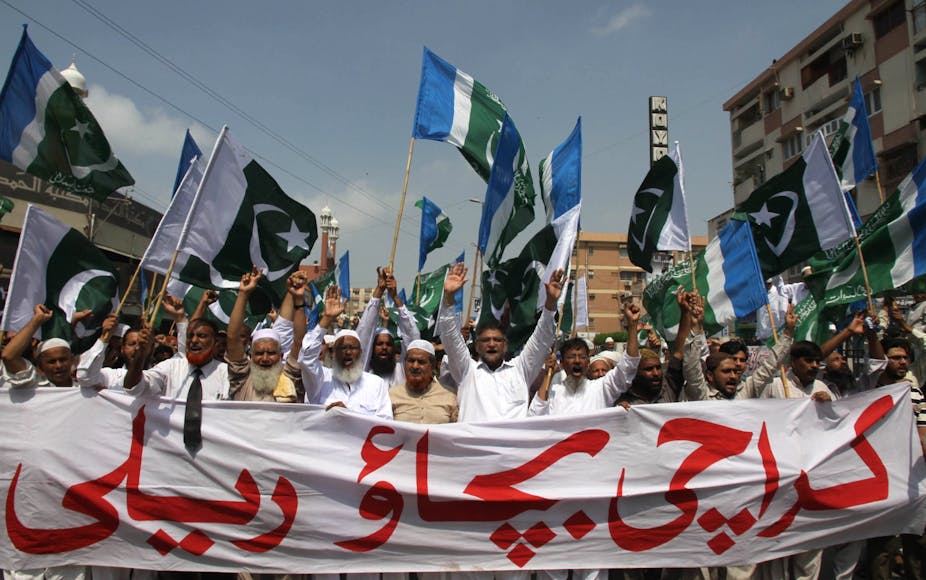There is a threat to Nato forces in Afghanistan which the world is ignoring. Violent gangs have been killing indiscriminately in Karachi, the Pakistani city vital to the supply chain which sustains ISAF forces in their fight against the Taliban.
In one week alone more than 100 people were killed and almost 800 have died since the beginning of the year.
Young men have been dragged off buses and shot in public. Or, worse yet, kidnapped, tortured and then their dismembered, mutilated bodies have been stuffed in bags and dumped on the street.
It’s not just men in opposing gangs who have been targeted, but ordinary women, children and the elderly are now fair game as well. Many of them are shot simply because they are members of a different ethnic group.
Most of these killings take place in the poorest parts of the city where there is inadequate provision of electricity, transportation, water, sanitation, health care, education and other social services.
People are avoiding markets, streets are deserted and many are not going to the office because they fear for their lives.
An ethnic conflict

To understand the reasons behind this out-of-control violence and growing anarchy in some parts of the city, one has to turn to the complex ethno-political fabric of Karachi.
The most important ethnic group in this city of 18 million people are the Muhajirs, the Urdu-speakers who originally migrated from India at partition in 1947.
They are principally represented by the Muttahida Qaumi Movement (MQM), and completely dominate the political landscape of the city.
The original inhabitants of the city, the Sindhis, have been turned into a minority, breeding resentment within the community. They tend to support the Pakistan People’s Party (PPP) – which runs the federal government.
The Pakhtun people have been steadily arriving from the northwest of the country since the 1980s.
Many have survived terrorist acts and the devastating floods of 2010, arriving in Karachi in search of better lives. They’re now the second largest ethnic group.
But while the National Awami Party (NAP) represents their interests nationally, it has no Karachi representatives in the national parliament and only two in the Sindh assembly.
This volatile mix is made even more lethal with the inclusion of other ethnic groups, including the Baluch, the Punjabis and thousands of Afghan refugees.
The Urdu speakers resent the arrival of the Pakhtun, and see them as muscling in on their political turf. And although the MQM holds 17 of the 20 Karachi seats in the National Assembly, it fears losing power to the ANP.
The MQM’s political enemies accuse it of using criminal gangs to terrorise Pakhtuns out of their homes, only to turn them over to their Urdu-speaking followers. Reportedly, all parties are playing this deadly game.
Trying to control the violence
The police, who are under-resourced, corrupt and poorly trained, are totally out of their depth.
Fortunately, the paramilitary Rangers have recently been given extra powers to try to control the situation. This seems to have helped - for the moment.
Members of both forces are regularly ambushed and killed.
Complicating the work of the security forces is the fact that weapons of all types are readily available to the criminal gangs. With weapons, comes power. Grenade attacks are now a common occurrence.
Politicians seem powerless to intervene. Tensions simmer between the parties which share power federally - the MQM, PPP and the ANP. They have regular high-level meetings to discuss the situation in Karachi, but are never able to agree on a solution.
What about the army?

In the meantime, calls for the army to intervene grow louder. Business groups, trade organisations, religious leaders, and various political parties think that would help restore order.
Yet the ruling PPP is opposed to the idea because it fears it would be seen by its political opponents as another confirmation that it is unable to run the country.
Some also worry that the insertion of the army in this volatile situation could be the thin end of the wedge, encouraging a return to military rule in Islamabad.
For its part the army has indicated that it is not impressed with the security forces’ handling of the situation. General Pervez Kayani, the Chief of Army Staff, has indicated that, he isn’t keen to send in his troops into Karachi, but he would help the civilian government to restore law and order, as the army did in 1992.
The economic impact
This state of quasi-anarchy in parts of Karachi is more bad news for a country which already has its fair share of problems.
Such high levels of indiscriminate violence frighten potential investors from a city which contributes 20 per cent of the country’s GDP and more than 70 per cent of Pakistan’s tax revenue.
But businesses are thinking of going elsewhere.
No immediate solution
There is no easy fix to this growing problem. But the sooner this violence is dealt with firmly the better for the inhabitants of the city, the country and the region.
Although the government’s decision to send the Rangers into the gang-controlled districts of Karachi is good news, most people hold very little hope that they will be able to fix the problem in the long-term.
If they fail, the army, which is the only armed institution strong enough to deal with the armed gangs, should be allowed to intervene for a limited period to disarm the various groups and bring back some semblance of normality to this mega-city.
The Chief Justice of Pakistan has said ominously that situations like the one in Karachi lead to military coups.
So this problem needs to be fixed quickly because the longer it festers, the less energy the government has to fight the most dangerous threat to the state: the Pakistani Taliban.

